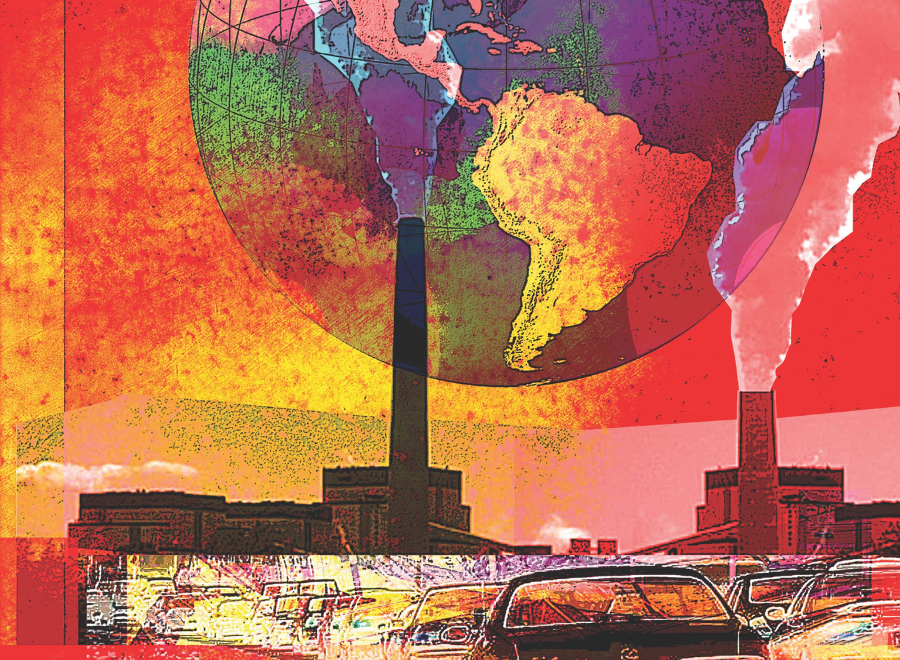With a background in theology and community organizing, I make very little use of my public-school arithmetic skills. But I know that any way you add it up, the math of climate change and resource extraction is becoming increasingly frightening.
Not long ago, young leaders from an organization called 350.org launched a global campaign to encourage people to pay attention to these climate and resource numbers. The math looks like this: there is widespread agreement that we must limit the global surface temperature to 2 C above the pre-industrial average if we are to avoid catastrophic risk for life on Earth. This means we can collectively emit 565 more gigatons of carbon dioxide, globally. Nothing more. The problem is, burning all of the fossil fuels that corporations currently have in their reserves would mean emitting 2,795 gigatons of carbon dioxide, five times that theoretically safe amount.
You may unsubscribe from any of our newsletters at any time.
Simply put, all of those reserves can’t be burned. Not just because a growing chorus of people say so, but because the planet physically and biologically cannot take it. Which puts all of us in an interesting moral place and a challenging financial place.
The response to this terrifying math is a new youth-led fossil fuel divestment movement. And a recent study from Oxford University says that it’s growing faster than any divestment movement before it.
So far, 10 universities and colleges and 22 cities have voted to divest their funds from fossil fuel companies, and there are over 500 active campaigns on campuses, in municipalities, and in places of faith around the globe. More than 20 religious institutions have voted to pursue fossil fuel divestment, including the national body of the United Church of Christ in the United States. The Church of England recently passed a motion to redirect its investments away from the fossil fuel sector to better align with the church’s theological, social and moral priorities.
In February, the congregation of Trinity-St. Paul’s United in Toronto voted unanimously to ensure that its own funds are not invested in any of the world’s 200 largest fossil fuel companies, becoming the first faith community in Canada to do so. Their leadership has sparked conversations among other congregations, and a call to the larger denomination to join the movement away from fossil fuels that threaten God’s Creation.
Climate change is a theological and a stewardship issue, and a significant opportunity for right relations with Aboriginal communities. Making real our commitment to reconciliation is going to mean standing in solidarity as Aboriginal communities from northern British Columbia to New Brunswick step up their resistance to this dangerous and gratuitous resource extraction. Our faith calls us to action, to be idle no more.
Climate change is a global justice issue, as those most heavily affected continue to be poor and marginalized communities, people least responsible for getting us into this mess. And climate change is a serious intergenerational justice issue. At a time when governments seem unwilling to take significant action on climate change, increasing numbers of young people see divestment as a tool for putting climate justice back on the radar. In an article posted on 350.org, Justin Whelan, the mission development manager at Paddington Uniting Church in Australia, speaks about his congregation’s divestment motion, describing it as “a little nudge to help them be the radical, prophetic people they want to be.”
Canadian faith institutions have a long and inspiring history of justice-seeking through moral, political and economic means. United Church members have been those radical, prophetic people before.
In 1975, the United Church and other faith groups formed the Taskforce on the Churches and Corporate Responsibility, and many faith institutions have since applied a negative screen to their stock holdings, barring investment in alcohol, gambling, pornography, tobacco and weapons.
And when student activists and theologians called faith groups to action on South African apartheid, the United Church rose in response. In 1986, amid a wave of successful divestment campaigns on university and college campuses, The United Church of Canada divested the shares it held in companies with investments in South Africa.
Divestment is not a new tool. Yet today’s divestment call is perhaps the most urgent and compelling thus far.
In 2011, the leaders of 61 of Canada’s largest faith communities and faith-based organizations signed an Interfaith Call for Leadership and Action on Climate Change. This strong and eloquent statement named the deep spiritual dimensions, and the justice implications, of the climate crisis. It acknowledged a need for political and economic action, stating, “We call for leadership to put the long-term interest of humanity and the planet ahead of short-term economic and national concerns. . . . How long can we barter this priceless inheritance for the promise of growing economic returns? . . . We cannot wait for others to act but instead must lead by example.”
That was in 2011. And we’re a long way from living up to this statement.
Still, fossil fuel divestment would be a big and challenging step, and there is some institutional reluctance to jump on board.
Of primary concern to pension and investment fund trustees, and others responsible for managing shared assets, is the fiduciary duty to maximize financial returns. This is especially pertinent at a time when finances are tight and the financial outlook is unstable. Amid such uncertainty, there’s a natural human inclination to act cautiously and avoid risk. However, our institutional investments may paradoxically be leading toward increased uncertainty and a massive drop in returns.
More and more studies, from organizations such as the Canadian Centre for Policy Alternatives, the University of Oxford and the World Bank, note that a “carbon bubble” presents a huge long-term risk for fossil fuel investments. Current prices are inflated based on reserves that are widely considered unburnable. About 24 percent of the Toronto Stock Exchange’s value lies in fossil fuel companies, whose market valuation is linked to assets that will have to stay underground. That’s a market bubble ready to burst.
A recent Forbes Magazine article predicts that “there will be a day of reckoning when it comes to fossil fuels, and investors need to take far stronger steps to avoid the climate cliff. Fundamental shifts in investment are warranted, and investors must begin diverting capital away from fossil fuels and toward clean energy at a much faster clip.”
A second worthwhile question revolves around the effectiveness of shareholder engagement with fossil fuel companies, a focus of many faith institutions striving to align their values with their finances. Globally, significant shareholder effort has gone into the Carbon Disclosure Project, a push for corporations to make their carbon emission calculations public, as a measurement tool for investors aiming to reduce the overall emissions of their portfolio.
Among young activists, however, there is an increasing distrust of corporations’ ability to self-disclose and to act responsibly when they are structured to maximize profit. There is concern as well about the timeline of these types of changes relative to the timeline that climate scientists have outlined.
Shareholder engagement has been effective on a number of fronts, but is it enough to address the climate crisis? Peter Chapman, executive director of the Shareholder Association for Research and Education, says, “One of the premises around investment is that you get the world you invest in.” Perhaps the divestment movement presents an opportunity to do just that.
This leads to the important question of employment. In a resource-dependent economy like Canada’s, lots of good, faithful, hard-working people depend on jobs in the fossil fuel sector. However, the reality is that oil and gas extraction doesn’t create nearly as many real jobs as the industry likes to claim.
Investing in a just transition to a green economy will produce more jobs than continuing on the path we’re on. A 2012 study from Blue Green Canada, an alliance of labour unions, environmental groups and civil society organizations, found that $1 million of investment creates the potential for only two jobs in the oil and gas industry, compared with 15 jobs in clean energy industries. That’s why American interfaith coalition GreenFaith’s fossil fuel divestment campaign has intentionally focused on reinvesting in green alternatives.
The clean energy future has benefits beyond jobs, too. It would address questions about the hypocrisy of divesting by creating energy alternatives for consumers.
Just like tobacco and weapons, challenging the power of fossil fuel companies can’t be done on an individual consumption level. The wealthy mix of industry marketing, lobbyists and government subsidies is too strong. It has resulted in an economy where fossil fuels are the easiest, and frequently the cheapest, way to travel, to stay warm and to produce goods. And with economic inequality on the rise, most Canadians are stuck feeling they have little choice. We need to decide collectively that we want better options, and find ways to powerfully voice that decision. Divestment is one such way.
Finally, we get to the question of effectiveness, of whether divesting the little money we have can make a difference. In a recent interview on CBC Radio, Phil Aroneanu, co-founder of 350.org, said, “The idea is that if we can’t pass the kind of climate legislation, the kind of carbon-cutting legislation that we need to solve climate change, then we’ll need to reduce the political power of the fossil fuel industry. . . . We are under no illusion that a few colleges and a few pension funds here and there divesting their money is going to really have an impact on the bottom line of, say, Exxon, which is the richest company in the history of money. What we really want to do is hurt their PR. And in doing so reduce their political power and their ability to stop legislation.”
The fossil fuel divestment movement is about challenging the powerful financial relationship between major fossil fuel corporations and our governments. Cam Fenton, director of the Canadian Youth Climate Coalition, echoes that the goal is to “erode the social licence of the fossil fuel industry.” And to replace it with renewed social licence for Aboriginal communities, scientists, environmentalists, affected front-line populations, young people and those who find the courage to imagine alternatives.
Jeanne Moffat, a member of the Climate Justice Group at Trinity-St. Paul’s United, says, “What seems to be missing in the discussion around ways to address climate change is moral leadership. It’s time for courageous moral leadership. It’s time to send a signal to the fossil fuel industry that they’ve lost their social licence to operate in the way that they’ve been operating. Not doing anything is a violation of our call to justice as Christians.”
Many people will tell you this can’t be done. Of course it can — it is already being done, by the congregants at Trinity-St. Paul’s and many others. It hasn’t been, and won’t be, easy. It will take courage and leadership. It will demand much from us. It is a lot like our faith itself.
Climate change is happening. It’s worsening. Our options for action are running out. Our government isn’t budging. And the call for real action on climate could use additional moral voices. Our voices.
***
This story first appeared in The United Church Observer’s April 2014 issue with the title “Divestment strategy.”














